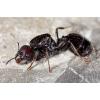There's a few things you can do if you want to keep a colony but it's gotten too big:
1- Limit the nesting space, less space and they won't be able to grow as big.
2- Limit the amount of food you are feeding them, less resources less ants will be reared by the colony.
3- Killing off workers [this is kind of a last resort thing, I don't like doing it but it does work if you want to thin down a colony without killing the whole thing]
I can agree with this.
I personally avoid #3 at all costs although I believe there are several different ways to eliminate excess workers. I will say the food approach will kill off some workers if you are wanting to downsize the colony utilizing that method.
Say you are currently going through what used to be a week's worth of food in one day (which may be hard to notice unless you are journaling about your ants), plateauing the current food supply will limit the ants produced (like dermy said). But if you are wanting to downsize back to one week's worth of food (in one week of course), I would advise gradually removing the amount of food over time. The method will kill off workers and reduce rearing, but the carcasses don't pile up as fast (and it might help to monitor your colony closer).
For me, I just see this method as a more or less "natural" way to reduce the size if it gets too big. I try to look at downsizing as mimicking food may become scarce for a colony in the wild.
Like gcsnelling said, I also very highly advise not releasing them (meaning the workers and/or entire colony) into the wild. The chance of introducing a new disease/pathogen is indeed slim but there is always a possibility it could happen. The reestablishment of endangered animals (and insects) are carefully monitored, like marine catch and release programs for example. The ants (more than likely) will also not know how to adapt to predators, rain, etc. since they have not been conditioned to it resulting in the colony dying off.
Please correct me if I have made errors about any of this.
Something to look at and think about (especially the reintroduction section):
http://www-personal....0/outline23.htm
Edit: Fixed a few grammatical errors.
Edited by Klassien, May 7 2017 - 2:33 PM.
























